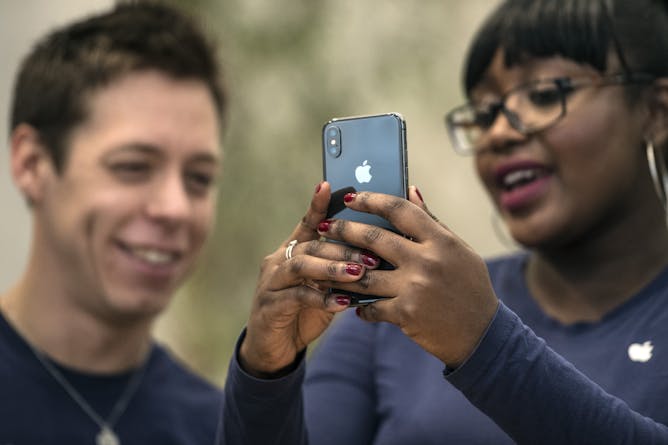|
|
|
|
As people flock to the internet for information on COVID-19, research from a Michigan State University professor of information systems suggests that people may be finding questionable content. Health experts rated the most viewed health-related YouTube videos on one subject as unreliable. As professor Anjana Susarla writes, “The most popular and engaging videos are significantly less likely to have medically valid information.”
Also today:
|
Nicole Zelniker
Editorial Researcher
|

|
|

Finding valid health care information on social media is harder than it seems.
Carl Court/Getty Images
Anjana Susarla, Michigan State University
Just because YouTube recommends a video doesn't mean it has medically valid information.
|
Health + Medicine
|
-
Taison Bell, University of Virginia
A key difference is people's behavior, as a doctor explains.
-
Michelle Sconce Massaquoi, University of Oregon
Finally, an answer to a long-bubbling question: What works best – bar or liquid soap?
|
|
Environment + Energy
|
-
Jessica Heiges, University of California, Berkeley; Kate O'Neill, University of California, Berkeley
Pandemic precautions have given new life to disposable plastic products, which the industry claims are more 'hygienic' than reusables. But critics say there's no scientific evidence this is so.
|
|
Ethics + Religion
|
-
Thomas Borchert, University of Vermont
Buddhist monks in Thailand continue to collect alms from households, despite the threat of the coronavirus. The reason: the practice is an important part of merit-making.
|
|
Arts + Culture
|
-
Jeffrey Miller, Colorado State University
For National Mac and Cheese Day, a food historian explains how the popular boxed dinner played an important role in kitchen science, wars and women's liberation.
-
Daaim Shabazz, Florida Agricultural and Mechanical University
Ever since the late 1800s, it has been standard for white to go first in chess. Has the time come to get rid of that rule?
|
|
Science + Technology
|
-
Isobel Ronai, University of Sydney; Brian Lovett, West Virginia University
Gene drive guarantees that a trait will be passed to the next generation. But should society use this tool to control insect populations?
-
Barbara Demmig-Adams, University of Colorado Boulder
Duckweed is the perfect space food: small, fast-growing and nutritious. By studying how light levels changed the production of radiation-fighting antioxidants, researchers made it even better.
-
Ferenc Dalnoki-Veress, Middlebury; Miles A. Pomper, Middlebury
Seventy-five years after the first nuclear detonation and nearly 30 years since testing was banned, the US is considering resuming live nuclear testing.
|
|
Education
|
-
Paul Shafer, Boston University
COVID-19 cases among college students are inevitable. If you're a college student – or the parent of one – you need to know who's going to foot the bill if they get sick.
-
David S. Knight, University of Washington
US cities and states are responsible for the vast majority of K-12 funding.
|
|
Politics + Society
|
-
Jessica R. Locklear, University of North Carolina at Chapel Hill
The Lumbee Tribe of North Carolina has a long history of struggle, protest and resistance to white supremacy and its social effects.
|
|
From our International Editions
|
-
Michael S. Kobor, University of British Columbia; Candice Odgers, University of California, Irvine; Kim Schmidt, University of British Columbia; Ruanne Vent-Schmidt, University of British Columbia
The pandemic response has put the long-term health and well-being of children and adolescents at risk, with the possibility of seismic shifts in population health if we do not act.
-
Paul Burke, Crawford School of Public Policy, Australian National University; Frank Jotzo, Australian National University; Rohan Best, Macquarie University
Having a carbon price is linked to lower emissions growth. A larger price cuts emissions by more.
-
Matt Cole, University of Birmingham; Ceren Ozgen, University of Birmingham; Eric Strobl, Université de Berne
Even accounting for factors like age and population density, the role of air pollution in explaining the spread of COVID-19 cases is compelling.
|
|
| |
| |
| |
| |
| |
| |
|
|
|
|
|
|
|